
The recent passing of Leonard Nimoy has got many of us reminiscing about his portrayal of the half-human, half-Vulcan, Mr. Spock. I am proud to say that I am an original Trekkie – I was glued to my television set for the initial broadcast of the first episode in September 1966 and every episode thereafter. Mr. Spock fascinated me, as he would put it. He was perpetually at war with himself, constantly working to subdue his emotions and live by logic alone. Yet his friendship with Captain Kirk and Dr. McCoy formed the emotional bedrock of the series. They were a devoted threesome, dedicated to space exploration, the lives of their crew, and of course, to each other. Countless times they got into tight spots and never hesitated to risk their own lives for each other. They also willingly risked their lives for the sakes of alien others. They lived by a moral code called “General Order 1” that privileged the needs of alien cultures ahead of their own lives. The famous ethic of noninterference was the governing principle of all interactions with alien civilizations.
What advice might Spock offer to us about the emotions that terrorism evokes? What mix of logic and emotion might he recommend? Even though Spock pursued the Vulcan goal of complete mastery of his emotions, they were emotions that he tolerated and even welcomed. While he disciplined his anger, hatred, and fear he clearly allowed himself the very human experiences of friendship, compassion, loyalty and love. Trekkies know that the Vulcan discipline of logic was a direct response to their warlike past, a deliberate attempt to temper the emotions that led to conflict and violence and ultimately entailed the real risk of self-destruction. The warlike Romulans, adversaries of Starfleet, shared a common ancestry with Vulcans. While Vulcans chose logic, the Romulans continued down the road of un-tempered emotion. Consequently, the Vulcans became peaceful while the Romulans evolved into a warlike species.
It’s safe to say that since 9/11 we have acted more like Romulans than Vulcans. We have been governed by two rather strong emotions: fear and patriotism. Fear for our own safety and patriotic love of country that privileges American lives and interests ahead of the lives and interests of others. It’s also fairly clear that the American response to 9/11 has been anything but noninterference. Because when we were overcome with a toxic mixture of grief and terror we threw logic aside. All we wanted was grim retribution and to keep the terror over there, whatever the cost in dollars, privacy, or lives. Since 9/11 we have never actually stopped to do a cost benefit analyses of our actions, choosing instead to be governed by ungovernable emotions and our irrational demands for emotional satisfaction.
My guess is that if we were able to take up the Vulcan challenge to discipline our fear and temper our patriotism, a very different kind of response to our enemies might emerge. Tom Engelhardt suggests as much in his article, My 10 Commandments for a Better American World. He uses a Spock-like approach in his analysis of how we got ourselves into the mess we are in today. He dares to dispassionately ask what our invasions of Afghanistan and Iraq have achieved. Putting aside his own horror at the “barbarity” of ISIS and the “arbitrary cruelty” of state power such as the Assad regime in Syria, he takes America to school on just what we have wrought in the world. His disconcerting conclusion is that “each of the terror organizations we categorize as the unimaginably barbaric Other has a curiously intimate, if generally unexplored, relationship with us.”
Rather than tactics born of fear, Engelhardt suggests a radically different approach that sounds suspiciously like General Order 1. I encourage you to read them all, but his first 5 Commandments directly address the uncomfortable reality that as we have been gripped by fear, we have inflicted the same fear on others.
Thou shalt not torture.
Thou shalt not send drones to assassinate anyone, American or not.
Thou shalt not invade another country.
Thou shalt not occupy another country.
Thou shalt not upgrade thy nuclear arsenal.
Englehardt’s “shalt not” list is a catalog of terrorist activities. We would realize that we have been hypocritical for condemning torture, invasion, assassination, and the pursuit of nuclear weapons in others while actively doing the same thing ourselves.
Spock would be justified in asking us to explain the logic behind our outrage at acts of terror committed against us but complacent about acts of terror that are committed by us. How can we explain to Spock why we weep for American victims of terrorism but not for victims of American terror? If we could control our fear and patriotic zeal, we would be able to feel different emotions. We would be ashamed of own violence and grieve for our victims, emotions that I believe Spock would encourage us to feel. Facing the truth about our own violence and taking responsibility for it is the Vulcan way. I long for it to be the American way someday soon.
For more on Star Trek see:
Star Trek II: The Wrath of Khan, the Logic of Violence, and My Inner Nerd











